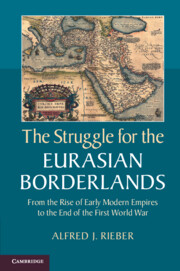 The Struggle for the Eurasian Borderlands
The Struggle for the Eurasian Borderlands Conclusion: Transition
Published online by Cambridge University Press: 05 June 2014
Summary
The long and problematic process of state-building by the multicultural empires of Eurasia had not been completed, in the eyes of the ruling elites, by the end of imperial rule. If they had survived the First World War, the acquisition of new territories and assimilation of wayward borderlands would certainly have continued. Throughout this process, this book has argued, what happened on the peripheries of the centers of power was far more significant than has generally been recognized. Frontier wars of conquest and the incorporation of the borderlands into the body politic had profound effects on the ideologies and institutions of imperial rule.
Frontier wars occurred in a geocultural space long characterized by large-scale population movements within varied landscapes, producing shatter zones of highly diverse ethnolinguistic, religious, and socioeconomic groups, kaleidoscopic in their internal rhythms of change. The military lines of advance and retreat divided rather than united peoples sharing one or more of those defining features, leaving Poles, Ukrainians, Serbs, Armenians, Kurds, Turkmen, Kirghiz, and Mongolians living under different flags.
- Type
- Chapter
- Information
- The Struggle for the Eurasian BorderlandsFrom the Rise of Early Modern Empires to the End of the First World War, pp. 615 - 617Publisher: Cambridge University PressPrint publication year: 2014


